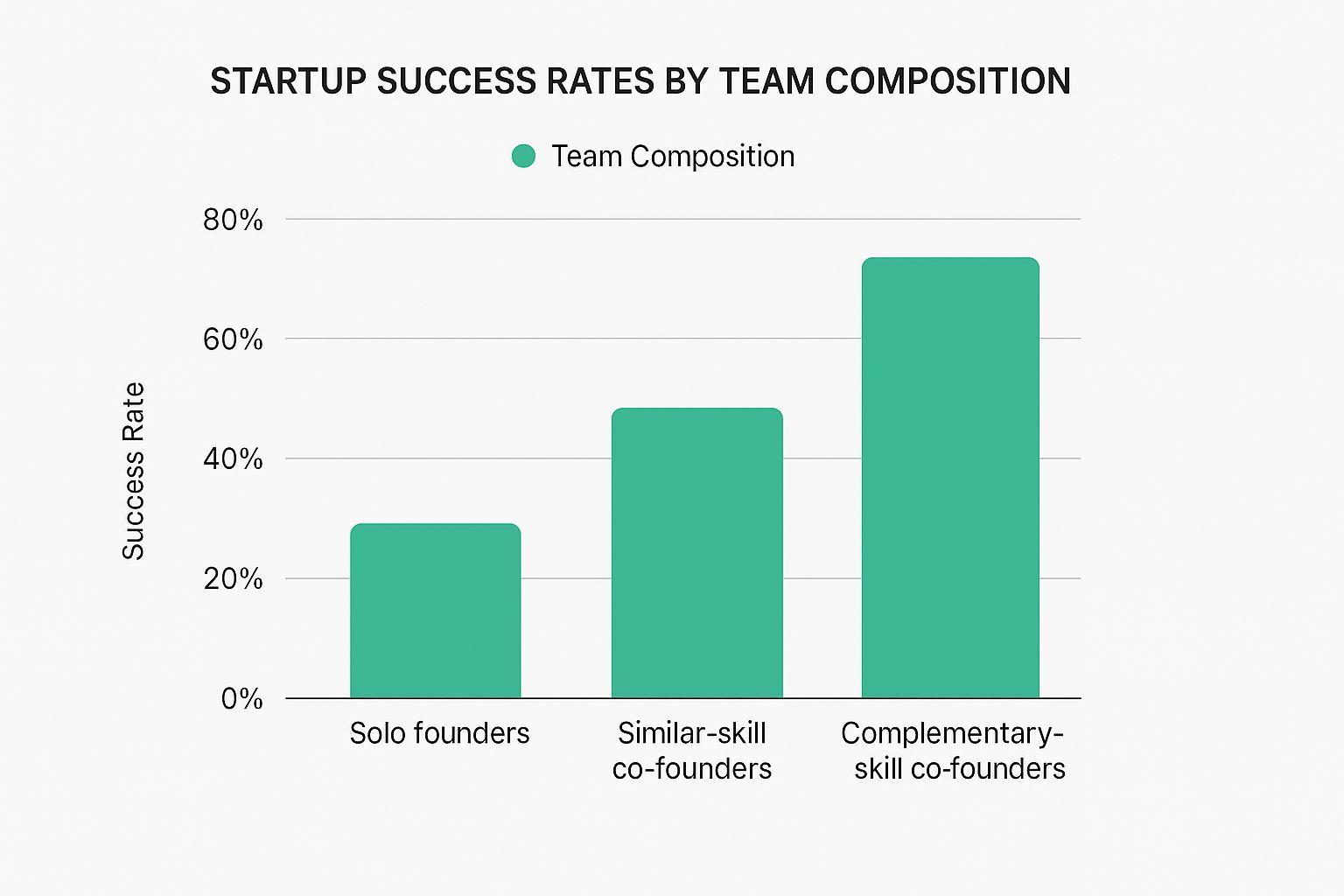Why Finding a Co-Founder Changes Your Startup Trajectory

Launching a startup is tough. Many founders initially go solo. However, bringing a co-founder on board can dramatically change a startup's path. This shift can unlock unforeseen advantages and reshape the entire entrepreneurial journey. The decision to partner up can be a defining factor in a startup's ultimate success. Want to know more about what a co-founder is? Check out this helpful article: What is a co-founder?
The Impact on Funding and Investor Appeal
One of the biggest ways a co-founder influences a startup's path is through funding. Investors often prefer founding teams with multiple members. They believe a diverse team has a wider range of skills and experience. This increases the chance of overcoming the hurdles of building a successful company.
For instance, a team with technical, marketing, and financial expertise is better equipped than a solo founder juggling everything. While the number of solo founders has been rising, their success with venture capital is lower than teams. In 2024, 35% of new startups had a single founder. However, they secured only 17% of VC funding. This shows the funding challenges solo founders face compared to teams, who often secure more investment. For more detailed statistics, see this resource: Funding Statistics.
The Power of Shared Burden and Support
Beyond funding, a co-founder introduces shared responsibility. This reduces the pressure on solo entrepreneurs. Having a partner provides a built-in support system, crucial for navigating the ups and downs of startup life.
Founders can share tough decisions and celebrate wins together. This builds resilience and prevents burnout.
Complementary Skills: A Recipe for Success
The best co-founders offer complementary skills. This creates a stronger, more adaptable company. One founder might excel at product development, while the other is a marketing expert.
This mix allows the startup to meet market needs effectively. Diverse perspectives within the team can lead to more innovative solutions. It also improves the ability to adapt when necessary. Different strengths within the team allow for faster execution and greater efficiency.
Interested in learning more about the benefits of a co-founder? Read this: Why choose a co-founder? This collaborative approach transforms a solo struggle into a shared journey towards growth and success.
Solo vs. Co-Founder: What the Data Actually Reveals
Finding a co-founder is a major decision in any startup's journey. But how does going solo or teaming up actually impact a startup's growth and ultimate success? This section explores the data and real-world experiences to offer a balanced perspective.
Examining Startup Performance Metrics
A crucial part of this comparison involves analyzing performance metrics. How quickly can a startup reach its target market? What's the speed of scaling? How resilient is the company when facing operational challenges? The answers often depend on whether there's a solo founder at the helm or a team. Interviews with founders who have experienced both approaches shed light on the day-to-day realities of decision-making, workload management, and adapting strategies. These experiences offer valuable insights into the practical differences between leading a startup solo versus with a partner. You can find further information on this topic here: Founder vs. Cofounder.
The following infographic visualizes startup success rates based on team composition, comparing solo founders to co-founders with similar and complementary skills.

As the infographic illustrates, startups with complementary-skill co-founders have the highest success rate at 70%. Those with similar-skill co-founders follow at 50%. Solo founders have a lower success rate of 30%. This underscores the importance of a balanced team with diverse expertise.
To further explore these differences, let's look at a table summarizing the key performance metrics.
The table below, "Solo Founders vs. Co-Founder Teams: Performance Comparison", presents key performance metrics comparing solo-founded startups with those having multiple founders.
| Performance Metric |
Solo Founders |
Co-Founder Teams |
Difference |
| Success Rate |
30% |
50-70% |
+20-40% |
| Time to Outgrow Startup Phase |
3.6x Longer |
1x |
-3.6x |
As this table clearly shows, co-founder teams experience significantly higher success rates and reach growth milestones much faster. This data highlights the advantages of shared workload, diverse skill sets, and mutual support that co-founders bring to a startup.
The Co-Founder Advantage: Speed and Accountability
Research consistently indicates that having co-founders can significantly influence a startup's trajectory. For instance, a founding team can often outgrow the startup phase much faster. Research from The Wharton School reveals that solo founders take 3.6 times longer to achieve this milestone. This difference highlights the value of shared skills and mutual support, mitigating risks associated with early-stage ventures. More on startup success can be found here: The Founder Factor on Startup Success: Solo vs. Co-Founders.
Furthermore, co-founders create a built-in accountability system. This fosters consistent progress and helps maintain focus. This inherent accountability can be a crucial factor for success, particularly during challenging periods.
When Going Solo Makes Sense
While co-founders frequently offer advantages, there are circumstances where going solo might be preferable. This is especially true for projects where a founder has a distinct vision and wants full control. However, even in these situations, building a strong advisory network is essential for external support and guidance. Finding a co-founder is a significant step, so carefully considering these different scenarios is crucial for informed decision-making.
Finding Your Perfect Match: The Skills Assessment Blueprint

Before embarking on the search for a co-founder, it's crucial to understand your venture's specific needs. This starts with a thorough self-assessment to identify your own strengths and weaknesses. This understanding is the cornerstone of finding a co-founder who complements your abilities and fills those essential gaps.
Identifying Your Strengths and Weaknesses
Think of this self-assessment process as taking inventory. You need a clear picture of what you bring to the table and where you need support. Honestly evaluating your skills forms the basis for defining the ideal co-founder profile. This profile goes beyond a simple resume.
It delves into specific technical skills, relevant experience, and even personality traits crucial for your business.
For example, if you're a technical founder, consider whether your skills are best suited for front-end or back-end development. Do you gravitate toward design or functionality? Understanding these nuances helps you identify a co-founder who can meaningfully contribute to your specific project. Furthermore, knowing your work style, such as your approach to risk and decision-making, will help you define the type of co-founder you need.
This focused approach ensures the partnership brings balance and strengthens the venture as a whole. The success of startups often hinges on the founders' experience. First-time founders have a success rate of approximately 18%, while those with prior successful ventures see a rate closer to 30%. This underscores the importance of experience in navigating the challenges of a startup. For more detailed statistics, check out this resource: Startup Failure Stats.
Defining Your Ideal Co-Founder Profile
Creating a detailed co-founder profile is like drafting a blueprint for your ideal partnership. It helps pinpoint the specific technical expertise and domain knowledge your business needs, guiding you in the right direction. This blueprint should include key elements like:
- Technical Capabilities: Specify programming languages, software proficiencies, or other essential technical skills.
- Domain Expertise: Detail relevant industry experience, market knowledge, or specific areas of expertise.
- Temperament: Outline desired personality traits, work ethic, and communication style.
This detailed approach ensures you're seeking a partner who truly complements your abilities, creating a balanced and diverse team – not a homogenous one. This balance is essential for the long-term health and success of any venture.
Avoiding the "Clone Syndrome"
Many founders initially seek co-founders who mirror themselves. This is often referred to as "clone syndrome." However, true strength lies in diversity. A complementary co-founder brings different perspectives and fills the gaps in your expertise. This diversity fosters innovation and creates a more resilient and adaptable team.
By understanding your own limitations and prioritizing complementary skills, you avoid the common pitfall of searching for a mirror image. This lays a stronger, more balanced foundation for your startup's future.
Where Exceptional Co-Founders Actually Hide
Finding the perfect co-founder can feel like searching for a needle in a haystack. Traditional networking advice often misses the mark. This section explores where you can actually find a compatible partner for your startup journey, uncovering both the usual suspects and some less-traveled paths.
Co-Founder Matching Platforms: Finding the Right Fit
Numerous platforms exist solely to connect potential co-founders. Some, like IndieMerger, utilize verified profiles and AI-powered matching to streamline the process. This targeted approach significantly reduces search time, allowing you to focus on promising candidates. However, not all platforms offer these features. Choosing a platform that prioritizes quality and compatibility is key.
Industry-Specific Communities: Tapping into Niche Networks
Engaging with industry-specific communities can be incredibly effective. Think online forums, Slack groups, and professional organizations. These spaces offer access to a concentrated group of individuals with relevant experience. If you’re building a FinTech startup, for example, immersing yourself in FinTech communities increases your odds of finding someone with the right industry knowledge and network.
Events: Focusing on Quality Interactions
Not all networking events are created equal. While large events can be useful for initial connections, smaller, more focused gatherings often prove more fruitful for finding a co-founder. Industry conferences, hackathons, and startup workshops create opportunities for deeper conversations and more meaningful connections.
The Art of Outreach: Making a Strong First Impression
Reaching out to potential co-founders requires a personalized touch. Generic messages often get lost in the noise. Instead, tailor your outreach. Highlight shared interests or mutual connections. Clearly explain your vision and why you believe this particular person would be a valuable addition to your team. A well-crafted message demonstrates your genuine interest and increases the likelihood of a positive response.
Initial Conversations: Assessing Compatibility
The first conversation is a crucial step. It's a chance to assess compatibility beyond skills and experience. Ask open-ended questions about their goals, preferred work style, and long-term vision. Actively listen to their responses and pay attention to how they communicate. This initial interaction is an interview for both of you, helping identify potential red flags or areas of strong alignment.
Structuring Your Partnership Proposition
A compelling partnership proposition is key to attracting top-tier talent. Clearly articulate the problem your startup solves, the market opportunity, and your future vision. Outline the roles and responsibilities of each co-founder. This transparency builds trust and sets a strong foundation for a successful partnership.
Expanding Your Network Authentically
Building a solid network takes time. Focus on developing genuine connections within your industry. Contribute meaningfully to online communities. Attend industry events not just to hunt for a co-founder, but also to learn and connect with others. Authentic engagement builds trust and cultivates a supportive network that can lead to valuable partnerships. Finding the right co-founder is a journey, not a sprint. By focusing on these strategies, you’ll significantly improve your chances of finding a partner who can help your startup flourish.
Beyond Skills: Evaluating True Co-Founder Compatibility

Finding a co-founder with the right technical skills is essential, but true long-term compatibility delves much deeper. Success hinges on often overlooked factors, such as shared values, conflict resolution styles, and risk tolerance. This section explores assessing these crucial elements through meaningful conversations and collaborative projects. For finding potential co-founders, consider exploring relevant job boards, such as Jobs.
Value Alignment: Building a Shared Vision
A shared vision forms the foundation of any successful co-founder relationship. This goes beyond simply agreeing on the business idea. True alignment lies in shared core values and long-term goals. This alignment guides decisions, shapes company culture, and steers the company through challenging times.
For instance, if one co-founder prioritizes rapid growth while the other emphasizes social impact, conflicts are bound to arise. Such fundamental differences create friction and can ultimately derail the partnership. Early and honest conversations about core values are essential.
Conflict Resolution: Navigating Disagreements
Disagreements are inevitable in any close working relationship. How potential co-founders handle conflict reveals much about their future success. Observe their reactions to differing opinions. Do they actively listen, compromise effectively, or resort to defensiveness?
Seek partners who approach conflict constructively, viewing disagreements as opportunities for growth and improvement. A willingness to communicate openly and find common ground is paramount for navigating the inevitable challenges of building a startup.
Risk Tolerance: Embracing Uncertainty
Startups inherently involve risk. Co-founders should have compatible risk tolerance levels. A highly risk-averse partner paired with a thrill-seeker can create tension and hinder decision-making, particularly during rapid growth or unexpected challenges.
Assessing Through Conversations and Trial Projects
Open-ended questions reveal how potential co-founders handle stress, process feedback, and navigate uncertainty. Inquiries about past experiences with challenging projects can offer insights into their problem-solving approach and resilience.
Beyond conversations, a small trial project provides valuable real-world insight. This allows observation of their work style, communication patterns, and how they respond to feedback in a practical setting. This offers a glimpse into daily collaboration.
Psychological Indicators and Red Flags
Certain psychological traits predict partnership longevity. Look for qualities like empathy, self-awareness, and a growth mindset, contributing to positive communication and strong problem-solving.
Conversely, be wary of red flags: excessive ego, lack of accountability, or blaming others. These can create toxic dynamics and damage the partnership.
Learning from Case Studies
Examining successful and failed co-founder relationships offers valuable lessons. Analyzing these cases provides a framework for evaluating intangible qualities that make or break a partnership.
The table below, the "Co-Founder Compatibility Assessment Framework," helps identify critical dimensions to assess when considering a potential co-founder.
Co-Founder Compatibility Assessment Framework
This table provides a comprehensive evaluation system for assessing potential co-founder matches across critical dimensions.
| Compatibility Dimension |
Assessment Questions |
Importance Level |
Evaluation Methods |
| Value Alignment |
What are your core values? Where do you see yourself in 5 years? |
High |
In-depth conversations, shared activities |
| Conflict Resolution |
Tell me about a time you disagreed with a colleague. How did you resolve it? |
High |
Behavioral questions, trial projects |
| Risk Tolerance |
How comfortable are you with uncertainty? What's your approach to calculated risks? |
Medium |
Scenario-based questions, past experiences |
| Communication Style |
How do you prefer to communicate? How do you handle feedback? |
High |
Observe communication patterns, trial projects |
This framework helps ensure a strong foundation for the co-founder relationship. Focusing on these key areas, you can move beyond skills and experience to truly assess co-founder compatibility, increasing the likelihood of a strong, enduring, and successful partnership.
Protecting Your Partnership: Essential Legal Foundations
A strong co-founder relationship, built on shared vision and mutual respect, is essential for any startup's success. However, even the strongest partnerships benefit from clearly defined legal frameworks. These frameworks protect all parties and provide a structure for the business to adapt and grow. This section explores the essential legal steps to ensure a secure and successful co-founder partnership.
Equity Allocation: Moving Beyond the 50/50 Split
While an even 50/50 equity split may seem straightforward initially, it can create issues down the line. A more effective approach allocates equity based on each co-founder’s anticipated contributions and value.
- Idea Generation: Who conceived the core business concept?
- Time Commitment: What level of time commitment will each co-founder make?
- Financial Investment: What are the financial contributions of each partner?
- Expertise and Skills: What unique skills and experience does each person bring to the table?
Considering these factors allows for a fairer, more balanced equity distribution that accurately reflects each co-founder's value to the venture. This upfront clarity can minimize potential disagreements in the future.
Vesting Schedules: Protecting Your Interests Over Time
Vesting schedules are a critical element of any co-founder agreement. They determine how and when each founder earns their equity. Typically, equity vests over a period of time, often four years, with a one-year cliff.
This structure means that if a founder departs before the one-year mark, they forfeit their equity. After the one-year cliff, equity typically vests monthly or quarterly. This protects everyone's interests should a co-founder leave, ensuring that equity is earned through continued contribution and dedication.
The Founder Agreement: Your Partnership Blueprint
A comprehensive founder agreement is fundamental to any co-founder partnership. This legally binding document outlines the key aspects of the relationship and the business itself. It's more than just a formality; it's a crucial tool for preventing misunderstandings and protecting all parties. Learn more in our article about Founders Agreement Template.
- Roles and Responsibilities: Clearly define each co-founder’s roles within the company.
- Decision-Making Process: Establish a clear process for making business decisions, including how disagreements will be resolved.
- Intellectual Property Ownership: Determine ownership of any intellectual property developed during the partnership.
- Exit Provisions: Outline the process for a co-founder's departure, including equity buyback provisions.
Intellectual Property: Protecting Your Creations
Clearly defining ownership of intellectual property is essential, especially for tech startups. The founder agreement should specify who owns any intellectual property created before and during the partnership. This includes code, designs, patents, and trademarks. This clarity helps prevent ownership disputes and protects the company's future.
Decision-Making and Exit Strategies: Planning for the Future
Establishing clear decision-making protocols is crucial for smooth operation. The founder agreement should detail how decisions will be made, especially regarding significant matters like funding, hiring, and strategy.
Exit provisions should also be carefully considered. These provisions outline what happens if a co-founder leaves the company, voluntarily or otherwise. They address how equity will be handled and offer a structured process for managing these transitions, protecting the remaining founders and ensuring business continuity. By addressing these legal elements from the start, co-founders build a strong foundation for a successful and lasting partnership. This allows the team to focus on building the business, knowing their venture rests on solid legal ground.
Building an Unbreakable Co-Founder Dynamic
The most successful co-founder relationships aren't built on luck; they're forged through consistent and thoughtful communication. This section explores the communication habits and accountability strategies that can prevent common partnership problems, drawing insights from interviews with established founding teams.
Establishing Clear Communication From Day One
From the outset, establishing clear roles, decision-making processes, and feedback loops is paramount. This clarity acts as a guide for how you'll collaborate and navigate inevitable challenges. Think of it as establishing the rules of engagement for a successful team.
Defined Roles: Clearly documenting each co-founder's responsibilities minimizes overlap and potential confusion. This ensures everyone knows their area of expertise and avoids stepping on each other's toes.
Decision-Making Protocols: Establishing clear processes for making decisions, from daily operations to significant strategic shifts, prevents stagnation and keeps the business moving forward. This might involve outlining who has the final say in specific areas or implementing a voting system.
Constructive Feedback Loops: Creating a safe environment for open and honest feedback is essential. This helps identify areas for improvement and ensures everyone feels heard and valued. Regular feedback sessions can be invaluable for continuous growth.
Maintaining Alignment During Pivotal Moments
Startups rarely follow a predictable path. Adaptability and maintaining alignment during critical moments are essential for co-founder harmony. Successful co-founders prioritize open communication throughout their journey.
This includes regular check-ins to revisit the company vision, discuss emerging challenges, and celebrate milestones. These consistent touchpoints ensure everyone remains on the same page and reinforces the shared commitment to the company’s success.
For example, imagine a startup encountering a significant market shift. Regular, transparent communication allows co-founders to assess the situation collaboratively, adjust their strategy as needed, and maintain a united front, even in the face of uncertainty.
Navigating Disagreements Constructively
Disagreements are inevitable in any partnership. The key is to manage them constructively without jeopardizing the relationship. Successful co-founders view disagreements as opportunities for growth and innovation rather than roadblocks.
Active Listening: Truly listening to and understanding each other’s perspective fosters empathy and helps uncover the root cause of the disagreement. This can lead to more effective solutions and prevent misunderstandings from escalating.
Compromise and Collaboration: A willingness to compromise and find solutions that benefit everyone strengthens the partnership and propels the business forward. It's about finding common ground and working together towards a shared goal.
Structured Conflict Resolution: Establishing a clear process for resolving conflicts, perhaps involving a neutral third party or mentor, prevents disagreements from escalating and damaging the relationship.
Practical Tools for a Strong Foundation
Here are a few practical tools you can implement to strengthen your co-founder dynamic:
Structured Check-Ins: Utilize templates for weekly or monthly check-ins to discuss progress, challenges, and potential opportunities. This creates a framework for productive conversations and ensures key topics are covered.
Conflict Resolution Approaches: Establish a framework for addressing disagreements constructively. This includes clearly identifying the issue, brainstorming potential solutions, and agreeing on a path forward.
Partnership Health Assessments: Regularly assess the health of your partnership through self-reflection exercises and open discussions. This allows co-founders to address any underlying issues before they escalate.
By implementing these communication strategies and utilizing the tools provided, co-founders can build a strong and resilient bond. This solid foundation allows them to navigate the challenges of building a startup together, significantly increasing their likelihood of success.
Ready to find the perfect co-founder to build a strong partnership? IndieMerger helps connect verified founders with complementary skills, making the search for a co-founder faster and more efficient. Check out IndieMerger today!